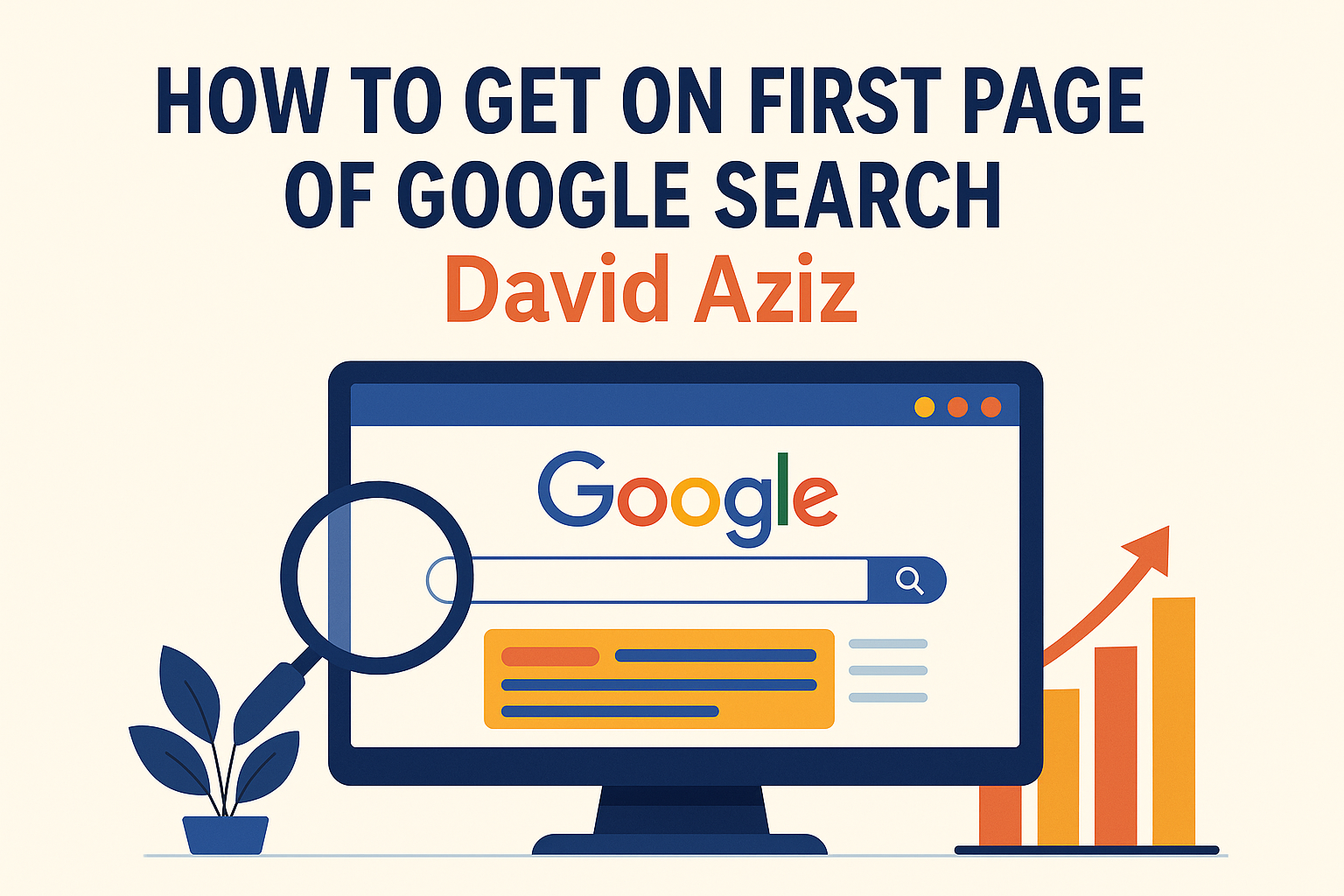Understanding Google Search Algorithms
To effectively navigate the complexities of digital marketing and “how to get on first page of Google search David Aziz,” it is essential to comprehend the mechanics of Google’s search algorithms. These algorithms determine the ranking of webpages based on a multitude of factors, which can broadly be categorized into relevance, authority, and user experience. Relevance refers to how closely a webpage’s content aligns with the search query entered by a user. This is primarily influenced by the presence of specific keywords and semantic phrases throughout the content.
how to get on first page of google search david aziz Keywords remain a fundamental aspect of search engine optimization (SEO). Properly incorporating relevant keywords in titles, headers, and throughout the text can enhance visibility. However, it is crucial to prioritize the natural flow of information over heavy keyword usage to avoid penalties from search engines for keyword stuffing.
Backlinks also play a significant role in the evaluation of website authority. When reputable websites link to your content, it signals to Google that your page is a trusted source of information, thereby improving your chances of ranking higher. A robust backlink strategy should prioritize quality over quantity; links from well-respected sites are far more valuable than numerous links from lesser-known pages.
Another critical factor is user experience, which encompasses website loading speed, mobile-friendliness, and ease of navigation. Google continually adapts its algorithms to ensure users receive high-quality search results. Therefore, a site that provides valuable content combined with a seamless user experience is likely to fare better in search rankings.
In essence, understanding how Google evaluates content quality and relevance is a foundational step for anyone looking to excel in online visibility. Implementing comprehensive strategies that align with these algorithm factors can significantly enhance efforts to secure a position on the first page of search results.
Keyword Research and Optimization Techniques
Understanding how to get on the first page of Google search is largely dependent on effective keyword research and optimization techniques. Keywords serve as the bridge between a user’s query and your content, making it essential to identify the most relevant ones. The first step is to brainstorm a list of potential keywords that relate to your niche or industry. This can include short-tail keywords, which tend to be more general, and long-tail keywords, which are usually more specific phrases that target particular user intent.
To refine this list, a variety of tools can assist in keyword research. Platforms such as Google Keyword Planner, SEMrush, and Ahrefs provide valuable insights into keyword volume, competition, and related searches. These tools not only highlight keywords that users frequently search for but also indicate how competitive these terms are. By focusing on less competitive, high-traffic keywords, you increase your chances of ranking higher on search engine results pages.
Once you have identified your target keywords, the next step involves optimization techniques. On-page SEO plays a crucial role here. Ensure that your primary keywords are included in essential areas such as headings, body content, and meta tags. Meta titles and descriptions should also utilize these keywords naturally, as they help convey to both users and search engines what your page offers. Additionally, using alt text for images is a vital optimization technique as it allows search engines to understand the content of your visuals, thereby contributing to your overall SEO strategy.
By thoughtfully integrating relevant keywords and utilizing effective optimization techniques, you can significantly improve your chances of achieving visibility, ultimately aiding your goal of how to get on the first page of Google search as outlined by David Aziz.

Creating High-Quality Content that Engages and Converts
Producing high-quality content is a fundamental pillar in the quest of how to get on first page of Google search, as articulated by David Aziz. High-quality content is characterized by several key attributes, including originality, relevance, and depth. Originality is vital; it not only enhances the credibility of your content but also makes it stand out in a sea of similar articles. Google rewards unique perspectives that provide fresh insights, which increases the likelihood of ranking higher in search results.
Relevance is equally important, as it ensures that your content addresses the needs and interests of your target audience. Conducting thorough research to understand what your audience is searching for allows you to create content that is pertinent and useful. Additionally, depth enhances the quality of your content; more comprehensive coverage of a topic signals to Google that your article is authoritative and well-informed.
Structuring articles effectively is another crucial element. Start with a clear and engaging introduction, followed by organized sections with subheadings that facilitate easy navigation. This layout not only improves reader experience but also enables search engines to index your content efficiently. Furthermore, incorporating visuals—such as images, infographics, and videos—can enrich your articles, making complex information more digestible and appealing.
To improve readability, use simple language, shorter sentences, and bullet points where appropriate. This approach caters to various reader preferences, reducing cognitive load and allowing for quicker absorption of information. Ultimately, by consistently delivering valuable, high-quality content that emphasizes audience needs, individuals can significantly enhance their chances of achieving higher rankings, thereby learning effectively how to get on first page of Google search.
Utilizing SEO Tools and Analytics for Continuous Improvement
In the evolving landscape of digital marketing, understanding how to get on the first page of Google search is crucial for any website. One of the most efficient methods to monitor and enhance your search engine optimization (SEO) strategy is through the use of various SEO tools and analytics. These instruments not only provide valuable insight into your website’s performance but also assist you in adapting your approach to achieve better results over time.
Popular tools such as Google Analytics, SEMrush, and Ahrefs facilitate the measurement of website traffic, keyword performance, and backlink analysis. Google Analytics, for instance, offers in-depth information about visitor behavior, allowing you to identify which keywords are driving traffic to your site and assess user engagement levels. With SEMrush, you can track your keyword rankings, discover new keyword opportunities, and even analyze your competitors’ strategies. Ahrefs, on the other hand, is known for its comprehensive backlink analysis which helps you understand the strength of your website’s link profile.
how to get on first page of google search david aziz Regularly updating content is another critical component of an effective SEO strategy. Fresh, relevant content not only engages your audience but also signals to search engines that your site is active and worth indexing. Experimenting with different approaches, such as varying content formats like videos or infographics, can yield better engagement rates and improve your overall ranking. Furthermore, using A/B testing to evaluate changes in your content allows you to see what resonates best with your audience, making it easier to refine your tactics based on data-driven insights.
By effectively leveraging SEO tools and analytics, you can track and analyze your progress systematically. This ongoing evaluation will enable you to continuously optimize your strategies, thereby enhancing your potential to secure a first-page ranking on Google, as emphasized by David Aziz in his insightful discussions on the subject.
